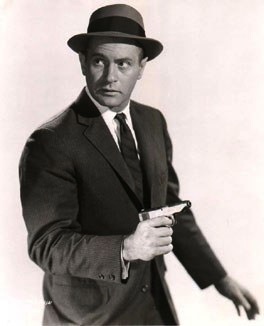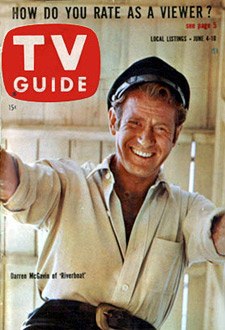Darren McGavin
d. February 25, 2006
Darren McGavin, hard-working, fast-talking, outspoken actor for more than 50 years who starred in six television series and gained lasting fame as vampire-hunting reporter Carl Kolchak in “The Night Stalker,” died Feb. 25 from multiple organ failure at a hospital in Los Angeles. He was 83.
McGavin was a scenery painter at Columbia Studios when he got his first bit part in 1945’s “A Song to Remember.” He soon moved to New York, where he studied at the Actors Studio and started to appear on stage and in early television programs. He spent 18 months as Happy in the road company of “Death of a Salesman,” and appeared throughout the 1950s in such Broadway productions as “The Rainmaker” with Geraldine Page, “My 3 Angels” with Walter Slezak, “The Tunnel of Love” with Tom Ewell and “Two for the Seesaw,” in which he replaced Henry Fonda in the lead. In 1964, he played the king in a Lincoln Center revival of “The King and I” opposite Rise Stevens as Anna.
His first TV series, Crime Photographer, was broadcast live on CBS in 1951 and 1952, with McGavin as the brash newspaper photographer Casey. It was based on the long-running radio series of the same title. He had parts in many other New York-based shows such as The Web, Danger, Lights Out, Tales of Tomorrow and Suspense, graduating to roles in TV’s prestigious live drama series, including Kraft Television Theatre, Philco Television Playhouse, The U.S. Steel Hour, Armstrong Circle Theatre, Robert Montgomery Presents and Studio One.
McGavin returned to Hollywood in the mid-50s and soon became one of the busiest actors in town. He appeared in three pictures released in 1955: “The Man with the Golden Arm,” “Summertime” and “The Court-Martial of Billy Mitchell.” His other movies include “Beau James,” “The Delicate Delinquent,” “Bullet for a Badman,” “The Great Sioux Massacre,” “Mrs. Pollifax: Spy,” “No Deposit, No Return,” “Turk 182,” “Airport ’77,” “Billy Madison” and the low-budget 1992 “Captain America” feature that went straight to video.
From 1957 to 1959 he played Mickey Spillane’s notorious private eye Mike Hammer in a syndicated series made by Revue. The character was toned down considerably for TV but the series still was more violent and risqué than anything normally seen on weekly television before the 1970s. To moral crusaders of the period, it was a perfect example of the tawdry programs they sought to ban. But McGavin dismissed the show and its critics, telling a reporter in 1968, “Hammer was a dummy. I made 72 of those shows and I thought it was a comedy.”
Starting in 1959, McGavin starred for two seasons in NBC’s Riverboat, playing Grey Holden, captain of the steamship Enterprise that cruised the Mississippi River in the 1840s. Burt Reynolds was his co-star in the show’s first season. NBC put McGavin back to work as unconventional private eye David Ross in The Outsider, a series created by Roy Huggins that ran only during the 1968-69 season.
In a pilot titled “McCaffrey” made for the 1964-65 season, McGavin played a CIA agent. The show was ABC’s potential entry in the coming spy craze but the network decided to pass, leaving the field clear for NBC’s The Man From U.N.C.L.E.
McGavin’s many Hollywood TV guest shots included episodes of Alfred Hitchcock Presents, Route 66, Death Valley Days, Rawhide, The Defenders, Dr. Kildare, The Virginian, Ben Casey, Gunsmoke, The Rogues, The Man From U.N.C.L.E., Mission: Impossible, Court Martial, Cimarron Strip, The Name of the Game, Mannix, Bracken’s World, The Bold Ones and Police Story.
McGavin also started to appear in many of the made-for-TV movies that crowded the network schedules in the early 1970s, including some — “Banyon,” “The Rookies,” “The Six Million Dollar Man” — that spawned TV series McGavin did not appear in. He starred in two made-for-TV spy movies, “Berlin Affair” (1970) with Fritz Weaver and “The Death of Me Yet” (1971) with Richard Basehart and Doug McClure.
On Jan. 11, 1972, ABC’s The Movie of the Week aired “The Night Stalker,” at first glance just another of the 90-minute pulpy adventures the network’s Tuesday and Wednesday Movie of the Week series churned out by the dozen. McGavin starred as Carl Kolchak, a brash reporter of the old “Front Page” school, past his prime but still plying his trade in seamy, glittering Las Vegas. While covering a series of strange murders, Kolchak discovers the startling truth that the Vegas cops are desperately trying to hide and that no one else will believe: the killer is an honest to goodness vampire.
Surrounded by a golden cast that included Simon Oakland, Carol Lynley, Ralph Meeker, Claude Akins, Elisha Cook, Kent Smith, Larry Linville, and Barry Atwater in the dynamically silent role of vampire Janos Skorzeny, McGavin was a fireball as the hardnosed reporter determined to bring in the scoop of his career. Scripted by fantasy master Richard Matheson from an unpublished novel by Jeff Rice, the film’s fast-paced mix of horror and humor was a sensation at a time when well-made fantasy was rarely seen. For years, “The Night Stalker” remained the highest-rated of all made-for-TV movies and was an acknowledged touchstone for later series such as The X Files and Buffy the Vampire Slayer. Dan Curtis, TV’s master of vampirism after the five-year run of his daytime monster serial Dark Shadows, produced the film.
“The Night Stalker’s” success led to a 1973 Movie of the Week sequel, “The Night Strangler,” a tamer outing also written by Matheson in which Kolchak, now working in Seattle, tangles with an impossibly old murderer. A year later, after scuttling plans for a third film, ABC announced that a weekly version of “The Night Stalker” would join its 1974-75 schedule.
The series, retitled Kolchak: The Night Stalker after a few episodes aired, had McGavin as Kolchak and Oakland as his bellicose editor now working for the Chicago office of a national wire service. As one supernatural killer after another descended on Chicago, Kolchak plunged gleefully into the fray in adventures that skillfully replicated the movies. Episodes were, for the most part, very entertaining but also grew very repetitive as Kolchak faced off with the monster of the week, week after week.
“I’m surprised that people don’t look at it and say it should be better,” McGavin said years later. “I know there’s an enormous affection for it and it’s wonderful that people feel that way.” As part of a Friday lineup that proved to be a ratings disaster, the Kolchak series lasted only one season but it remains a fondly remembered last burst of brilliance among the mundane cop shows that dominated the 1970s airwaves.
McGavin went on to another cult role in the 1983 picture “A Christmas Story,” based on humorist Jean Shepherd’s memories of his Midwest childhood in the 1940s. The movie was something of a flop on release, but it’s become a TV perennial, thanks in no small part to McGavin’s portrayal of the irascible father who battles furnaces and hound dogs while proudly displaying his prized table lamp that’s shaped like a shapely female leg.
Also in 1983, McGavin starred in his sixth and last TV series, Small & Frye, a comedy that cast him as a clichéd Sam Spade-style private eye whose partner had the ability to shrink to six inches in height. It was a poor effort that ran only two months on CBS. McGavin said he did it for his grandchildren.
Some of his later roles also include the 1979 mini-series “Ike,” in which he played General George S. Patton, and the 1980 mini-series “The Martian Chronicles” with Rock Hudson, as well as episodes of Magnum P.I., Murder She Wrote, Highway to Heaven, Sisters and the 90s revival of Burke’s Law. After his many years in television, McGavin finally won an Emmy in 1990 for his guest role as Candice Bergen’s father in Murphy Brown. He had not worked since 1999 when he suffered a stroke while filming an episode of The X Files, the fantasy series produced by Kolchak fan Chris Carter.
McGavin was married for many years to actress Kathie Browne who also had a long career in television and appeared with him in a number of shows including “Berlin Affair” and episodes of The Outsider and Kolchak. She died in 2003.










